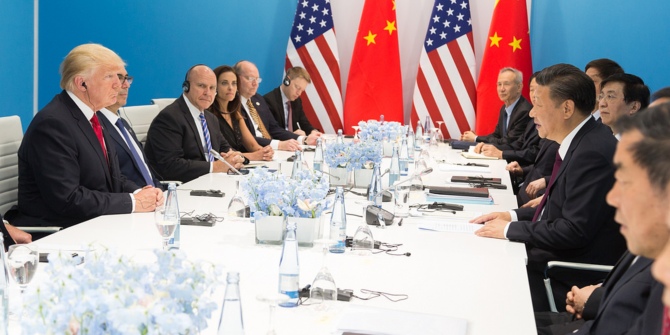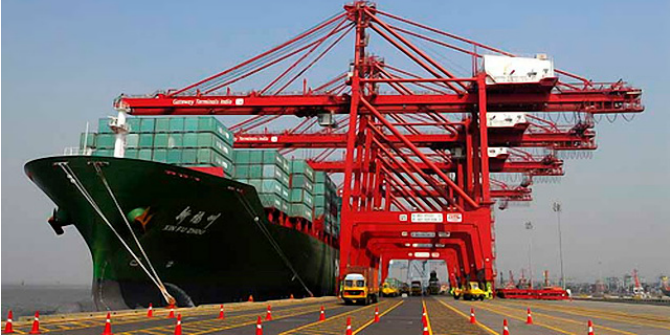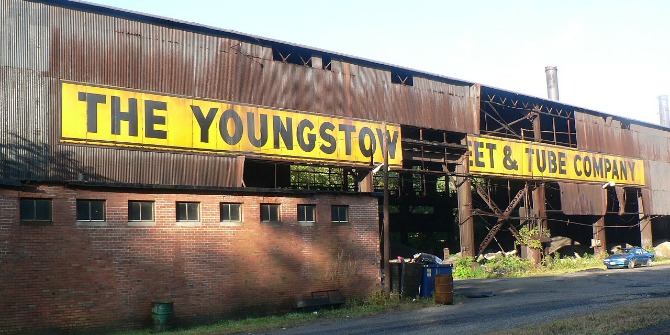 Last night the LSE US Centre held an evening of discussion and commentary on the Super Tuesday results which saw Donald Trump and Hillary Clinton come out on top for the Republican and Democratic parties respectively. Here US Centre Director Peter Trubowitz gives a summary of his points from the discussion, including his thoughts on the primary campaign so far, and his predictions for the next few weeks, and also comments on the effects the election might have on America’s role in the world.
Last night the LSE US Centre held an evening of discussion and commentary on the Super Tuesday results which saw Donald Trump and Hillary Clinton come out on top for the Republican and Democratic parties respectively. Here US Centre Director Peter Trubowitz gives a summary of his points from the discussion, including his thoughts on the primary campaign so far, and his predictions for the next few weeks, and also comments on the effects the election might have on America’s role in the world.
What’s the big takeaway from the Super Tuesday results?
There are many: the breadth of Trump’s victory which saw him take states like Alabama and Massachusetts which could not be more different; the depth of Clinton’s support in the African-American community; and Rubio’s failure to capitalise on his frontal assault against Donald Trump in last week’s raucous Republican debate. But the thing that has lingered with me the most have been Clinton and Trump’s victory speeches on Tuesday night. Clinton talked about making ‘America whole again,’ an obvious play on Trump’s promise to ‘Make America great again’ and his divide and conquer tactics. Trump turned his sights on Clinton blasting her as part of the problem in Washington, not the solution. You could be forgiven for thinking 2016, unlike 2008, is going to be a battle between “hope” and “change.”
What has surprised you the most about the campaign this year?
What has surprised me the most – and it really shouldn’t have — is the sheer depth and breadth of the anger and resentment in the American electorate. People are angry at Washington and they are angry at Wall Street. Trump has tapped that resentment on the right; Sanders has done the same, albeit without the bombast and xenophobia, on the left. While Sanders’ path forward would seem shaky at best, Trump is well positioned to garner all or at least most of the delegates he needs to get to the general election. Anger doesn’t usually translate into delegates, but it is this year and that I think it tells us something about the scope of the challenge that will face whoever becomes the next president.
What effect might this election have on America’s role in the world?
America is flirting with isolationism. It does this from time to time, but you really have to go back to the post-Vietnam era in the 1970s to find another period where frustration with America’s outsized role in the world runs as deep as it does today. You can hear it in Trump’s campaign rhetoric about one-sided international commitments and ’burdensome’ allies in Asia and Europe. You can hear it in his talk about building walls against Mexican immigrants and Chinese goods. This is not new; it’s been building for some time in the United States. If Trump and Clinton become the candidates, I predict that we will see these issues and the larger question of America’s international purposes, joined in a way that they have not been connected in American politics for a long time.
What should we be looking for in the weeks ahead?
I’ll be looking for five things: (1) Whether Trump doubles down on his economic message that is geared to white working class voters. This is the place for him to go; it’s where the Democrats, and Clinton in particular, are vulnerable and it does most of the heavy lifting for him inside the Republican going forward; (2) If and when Massachusetts Senator Elizabeth Warren endorses Clinton. Her support will make it easier for those feeling the Bern to support Clinton. Of course, Warren has good reason to make Clinton work for the endorsement. (3) How downstream Republicans up for reelection this year respond to yesterday’s results in the coming days: whether they begin to make peace with Trump or put distance between themselves and the putative Republican front runner; and finally (4) Whether John Kasich can get traction. He is the sleeper, the candidate most likely to beat Clinton in the general election. But he’s been stuck in a Republican traffic jam, a pile up really. Can he get out in time? We’ll find out over the next two weeks in Michigan and Ohio. (5) Finally, and maybe most importantly – I expect the remaining GOP contenders to be running a kind of ‘prevent defense’ which would see them, individually and perhaps, collectively, trying to deny Trump the magic number (1237) of delegates he needs to secure the nomination.
Featured image credit: Jeff Djevdet, https://speedpropertybuyers.co.uk/(Flickr, CC-BY-2.0)
Please read our comments policy before commenting.
Note: This article gives the views of the author, and not the position of USAPP – American Politics and Policy, nor the London School of Economics.
Shortened URL for this post: http://bit.ly/1OTNZSn
_________________________________
About the author
 Peter Trubowitz – LSE US Centre
Peter Trubowitz – LSE US Centre
Peter Trubowitz is Professor of International Relations, and Director of the LSE’s US Centre. His main research interests are in the fields of international security and comparative foreign policy, with special focus on American grand strategy and foreign policy. He also writes and comments frequently on U.S. party politics and elections and how they shape and are shaped by America’s changing place in the world.







“Hope” and “Change” make an interesting dichotomy, the one passive and the other active — I wonder whether I understand which candidate the author intends for which label, both tend to re-brand themselves a bit.
Agreed that isolationism is becoming the issue — as it is in Brexit — in the US it’s a resurgent cancer far more broad & deep now than any of us imagined, yes, including any candidates, mere opportunists and others. It has a long & bumptious history in both our nations, tho, so we should know how to deal with it: “trade is war by peaceful means”, for example…
The point the article makes about Warren is a good one, kudos — she’s in the hot kitchen now, but she wanted it, & she can take the heat — she’ll do OK, fine person, and thank goodness she’s there.
About Kasich, however: do you really think there’s a hope? I question whether he’s really, “the candidate most likely to beat Clinton in the general election”: I live on the US Left Coast, and out here we’ve never heard of him… of course out here in California we can’t find Ohio on a map, either, but ask us where Singapore is…